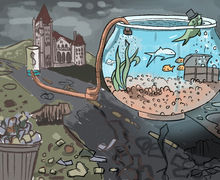Hemp should pave way for recreational marijuana legalization
Cannabis is a misunderstood plant just trying to find its place in our society. While marijuana is often just seen as a means to get high, you can do that and so much more: like any other plant, cannabis has recreational, medicinal and textile qualities to it.
JD Farms in Westchester, New York, has recently started growing hemp to be used for clothing, food and paper, among other things, making it the first in-state farm to do so in 80 years, according to The New York Times. But the operation of cannabis farms in the state should go a step further from just industrial hemp and medical marijuana to include recreational marijuana as well.
Of course, with more publicized research on the plant’s useful qualities, the stigma will fade and legalization can follow. And apart from allowing more freedom to New York residents, full legalization of marijuana would rake in jobs for the state — especially since the upstate and central New York have primarily agricultural economies.
When Colorado allowed the sale of recreational marijuana in 2014, 1,000 to 2,000 new jobs were created in four months, according to Marijuana Business Daily. Overall, Marijuana Industry Group estimated that there were 10,000 jobs directly involved with cannabis — both medical and recreational — in the state at the time. Unfortunately, the markets for all kinds of marijuana and even hemp remain untapped due to stigma. State governments are missing out on a huge economic opportunity by not utilizing this versatile plant.

Emmy Gnat | Contributing Illustrator
President Barack Obama even signed the Agricultural Act of 2014, which allows universities and state departments of agriculture to cultivate hemp for limited industrial purposes. Since then 29 states, including New York, have legalized hemp to be used as an industrial crop. Still, this is only a little more than half of the states, which shows how timid state governments are to start making progress when it comes to hemp, medical marijuana and other cannabis products.
The state does abide by the Compassionate Care Act: New York residents who are certified by a local, registered physician can receive medical marijuana treatment.
“Improving patient access to the medical marijuana program is a top priority for DOH,” said a New York DOH representative in an email interview. “To date, the program has registered more than 700 physicians and more than 8,900 patients have been certified, and we are currently acting on a number of recent recommendations that will further strengthen the program and increase patient access.”
Even with the small victories, such as hemp legalization and proposed home delivery of medical marijuana for registered patients, marijuana is still stuck with a bad rap. This negative connotation has clearly resulted in slow-moving legislation of state and local governments.
Part of the problem is also how stigma is reinforced by the discrepancy between state and federal governments, not just hemp and medical and recreational marijuana. The Drug Enforcement Administration, the federal authority on drugs, still places cannabis into its Schedule I category and orchestrates crackdowns crackdowns in historically marijuana-progressive states like California. Better education and more thorough, sound legislation would allow farmers to grow the plant without confusion and at their fullest potential.
In public dialogue on marijuana, a more pointed focus on the benefits needs to come to the forefront instead of stereotypes of the plant. While the recreational benefits can be contested, the usefulness of medicinal marijuana and hemp can’t be denied. And even then, whether you’re for marijuana or against it, incorporation of hemp into New York state’s crop lineup could add another dynamic to the local agricultural industry.
With lessened stigma and regulation, cannabis use could flourish in New York — especially once we realize its potential beyond just rolling up.
Max Kaczor is a senior environmental studies major. His column appears weekly. He can be reached at mjkaczor@syr.edu. He can be followed on twitter at @maxkaczor.
Published on October 23, 2016 at 10:39 pm





